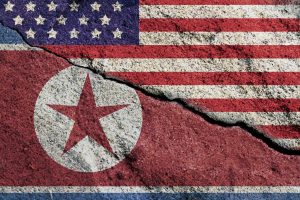North Korea gave a warning to the United States on May 2, a day after the White House spokesperson said the Biden administration had finished reviewing its policy toward North Korea.
In a statement by Kwon Jong Gun, head of the North Korean Foreign Ministry’s North America Department, North Korea warned that it would seek “corresponding measures” after U.S. President Joe Biden’s speech at Capitol Hill last week. Biden said the United States plans to deal with North Korea’s nuclear threats through “diplomacy and firm deterrence.” In the statement, Kwon said that if the United States tries to approach North Korea-U.S. relations through “outdated and old-school policies” from the perspective of the Cold War, it will face an increasingly unaffordable crisis in the near future.
White House Spokesperson Jen Psaki unveiled the Biden administration’s new policy toward North Korea on April 30, saying that the policy will not focus on achieving “a grand bargain, nor will it rely on strategic patience.” Psaki added, however, that its goal remains “the complete denuclearization of the Korean Peninsula” and emphasized that the policy was made after consultations with Seoul, Tokyo and other allies.
Along with the statement denouncing Washington’s new policy and Biden’s comment, Pyongyang also denounced a U.S. State Department spokesperson’s remarks over the North’s human rights. State Department spokesman Ned Price had issued a statement on April 28 criticizing North Korea as one of the world’s most oppressive and totalitarian states. A separate statement from a Foreign Ministry spokesperson called Price’s comments an insult to Kim Jong Un, the North Korean leader.
As Pyongyang has beefed up its signaling toward Washington in recent days with harsh statements, experts say the North’s recent responses are strategic criticisms to get the U.S. to provide what they want, such as the withdrawal of hostile policies.
The Biden administration’s new policy toward North Korea aims to achieve North Korea’s denuclearization by gradually resolving issues with the North, focusing on diplomacy and the goals set by previous administrations.
“From the North’s point of view, the Biden administration’s policy toward North Korea was set in a more acceptable way. The Biden administration’s position to respect the Singapore Agreement can be seen as Washington’s concession to Pyongyang,” Park Won-gon, a professor of North Korean studies at Ewha University in Seoul, told The Diplomat. The Singapore Agreement was signed by Kim and then-U.S. President Donald Trump during their historic summit in 2018. Park also said that the Biden administration had no choice but to craft its policy toward North Korea in consideration of the policies taken by previous governments over the past 30 years, as there is no clear solution to bring about the denuclearization of North Korea.
Park said that the core goal of North Korea’s recent condemnation is to get the United States to withdraw its hostile policy. Pyongyang is raising its voice to heighten tensions on the Korean Peninsula as “a strategic act” that increases its bargaining power against Washington.
“Since the Biden administration has stated that it will not take ‘strategic patience’ toward the North, it will try to contact North Korea, even though the North has been adamant that it will not engage in talks with the U.S. before its demands have been met,” Park said.
Before the Biden administration’s new policy was officially announced, U.S. Secretary of State Antony Blinken and White House National Security Advisor Jake Sullivan suggested that the North’s denuclearization can be achieved through the phased denuclearization method that the Obama administration introduced for Iran.
The 2015 Iran nuclear agreement, which was scrapped by the Trump administration, involved easing economic sanctions in return for Iran’s pledge to defer nuclear weapons development and submit to international inspections. On the other hand, the Libyan model sometimes raised in the North Korean context was a “go big or go home” approach, where the U.S. demanded that Libya complete dismantlement of its nuclear weapons and then provided compensation as a follow-up action.
“In the big picture, it is right to achieve denuclearization in the same direction as the Iran nuclear agreement. However, North Korea wants a different way in the phased denuclearization process than Iran has accepted, and it has no intention of phased denuclearization under a concrete and long-term plan as Iran accepted from the U.S.,” Park said.
Unlike North Korea, Iran has never conducted nuclear tests or produced nuclear weapons, and the nuclear agreement was made as a “Joint Comprehensive Plan of Action” with the United States and other major countries. Given the circumstances, however, Pyongyang would consider reaching an agreement only with Washington, even if it could get assistance from China and Russia. With this limited approach and environment surrounding the Korean Peninsula, it may be difficult for Seoul to play the role of a mediator again at a time when Washington has strained relationship with Beijing, experts said.
North Korea wants to be officially recognized as a nuclear power by the international community, but the United States will never accept it. As a result, experts raised the possibility that the U.S. may not have many options for resuming dialogue with North Korea, as the North has already vowed not to return to the negotiating table unless economic sanctions and hostile policies are removed first.
































